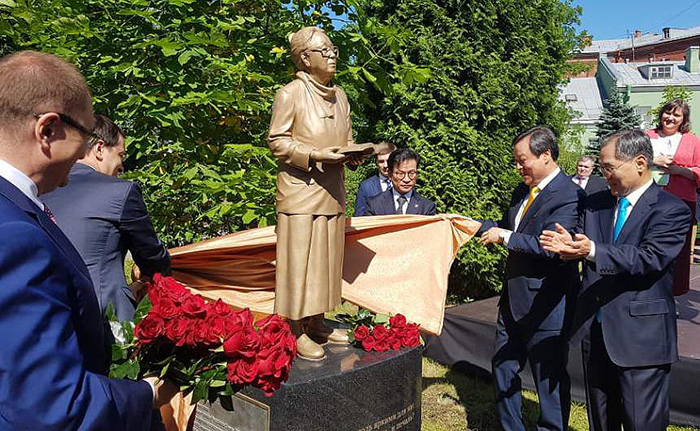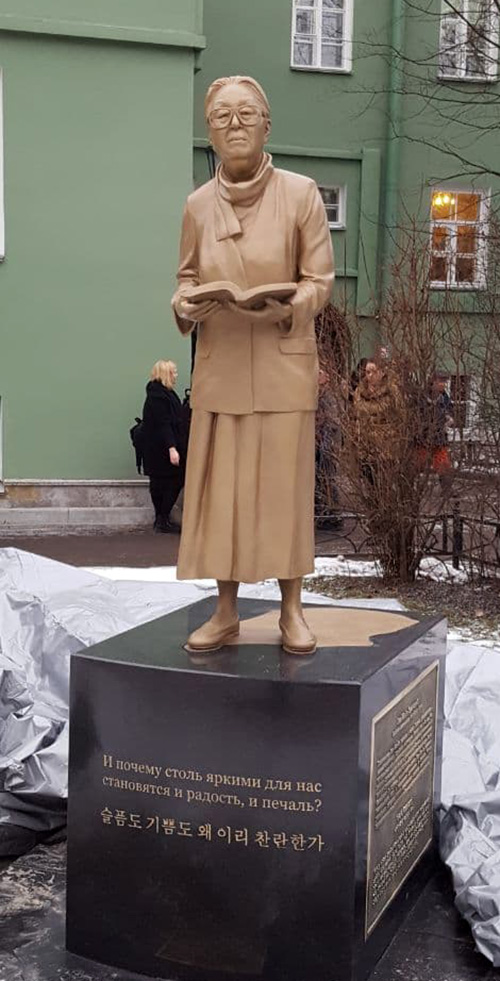
Minister of Culture, Sports and Tourism Do Jonghwan unveils a bronze statue of Korean author Park Kyong-ni, alongside Russian officials, at Saint Petersburg State University in Russia on June 20. (Ministry of Culture, Sports and Tourism)
By Sohn JiAe
A bronze statue of famous Korean author Park Kyong-ni (1926-2008) has been set up on the campus of Saint Petersburg State University in Russia.
Park is one of the most lauded authors in the country, known the most for “Toji,” or “The Land,” an epic novel that follows a family from late Joseon through to colonial times, from their collapse to resurgence.
On June 20, one day before President Moon Jae-in makes his state visit to Russia, the 135 cm statue that depicts the author holding a book in her two hands, was made public at the Oriental Studies building.
The granite plinth -- 850-mm high and rectangular -- has an inscription in both Korean and Russian. It's a line from Park’s poem “Life”: Why are both sorrow and joy so brilliant?
A brief message to introduce the author is inscribed on the stone in Russian, as well: One of Korea’s representative authors, who was born in Tongyeong, Gyeongsangnam-do Province, Park Kyong-ni left behind a number of novels, poems and essays before she passed away at the age of 82. The epic novel “Toji” that narrates the turbulence of modern and contemporary Korean history, is one of Park’s signature works. Based on deep introspection, Park has embraced in her writings an unwavering belief in human dignity and has sublimated the fate of the nation and of the individual into a literary monument with a flowing and bold style of writing.

A bronze statue in honor of author Park Kyong-ni is set up at the Saint Petersburg State University in Russia. Pictured is the statue before its official unveiling ceremony on June 20. (Korea-Russia Dialogue)
The university, established in 1724, has produced many artists and scholars. The Oriental Studies building is where Kim Byeong-ok, a Joseon interpreter between 1897 and 1917, taught Korean, a first for a European country.
The move to erect the statue started in 2013, as part of a cultural and diplomatic project by the Korea-Russia Dialogue, a private organization that promotes dialogue between Seoul and Moscow. Russia asked the organization in 2012 to construct a bronze statue of Russian poet and novelist Aleksandr Pushkin in Seoul, and in November 2013 a Pushkin statue was erected at Lotte Hotel in Jung-gu District, Seoul. The Park Kyong-ni statue is the reciprocal statue.
Russian Minister of Culture Vladimir Rostislavovich Medinsky said during the unveiling ceremony, “As Pushkin has long been beloved here in Russia, the Korean people respect Park Kyong-ni and feel very proud of her work.”
“We hope that this statue will become a symbol of literary exchanges and the friendship between the two countries,” the minister added.
The ceremony had in attendance about 50 people, including Minister of Culture, Sports and Tourism Do Jonghwan, Korean Ambassador to Russia Woo Yoon-keun and Kim Young Joo, the daughter of the author and chairwoman of the Toji Cultural Foundation.
jiae5853@korea.kr